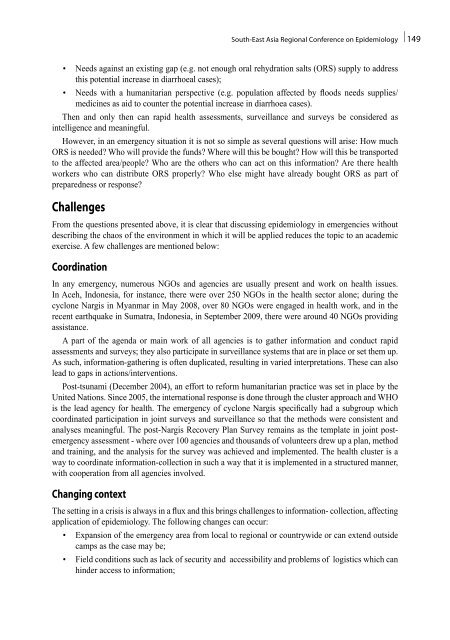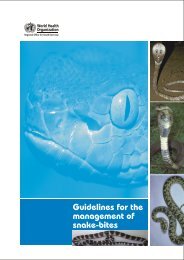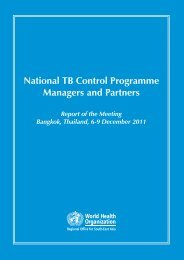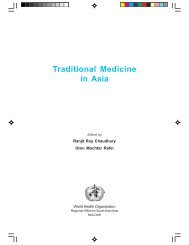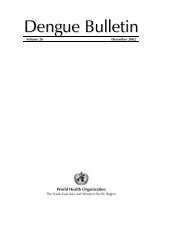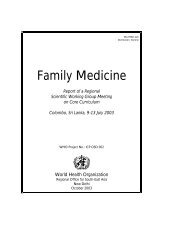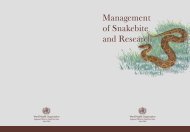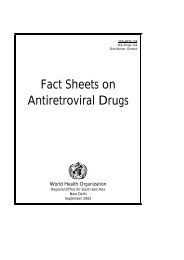South-East Asia Regional Conference on Epidemiology
South-East Asia Regional Conference on Epidemiology
South-East Asia Regional Conference on Epidemiology
You also want an ePaper? Increase the reach of your titles
YUMPU automatically turns print PDFs into web optimized ePapers that Google loves.
<str<strong>on</strong>g>South</str<strong>on</strong>g>-<str<strong>on</strong>g>East</str<strong>on</strong>g> <str<strong>on</strong>g>Asia</str<strong>on</strong>g> <str<strong>on</strong>g>Regi<strong>on</strong>al</str<strong>on</strong>g> <str<strong>on</strong>g>C<strong>on</strong>ference</str<strong>on</strong>g> <strong>on</strong> <strong>Epidemiology</strong> | 149<br />
• Needs against an existing gap (e.g. not enough oral rehydrati<strong>on</strong> salts (ORS) supply to address<br />
this potential increase in diarrhoeal cases);<br />
• Needs with a humanitarian perspective (e.g. populati<strong>on</strong> affected by floods needs supplies/<br />
medicines as aid to counter the potential increase in diarrhoea cases).<br />
Then and <strong>on</strong>ly then can rapid health assessments, surveillance and surveys be c<strong>on</strong>sidered as<br />
intelligence and meaningful.<br />
However, in an emergency situati<strong>on</strong> it is not so simple as several questi<strong>on</strong>s will arise: How much<br />
ORS is needed? Who will provide the funds? Where will this be bought? How will this be transported<br />
to the affected area/people? Who are the others who can act <strong>on</strong> this informati<strong>on</strong>? Are there health<br />
workers who can distribute ORS properly? Who else might have already bought ORS as part of<br />
preparedness or resp<strong>on</strong>se?<br />
Challenges<br />
From the questi<strong>on</strong>s presented above, it is clear that discussing epidemiology in emergencies without<br />
describing the chaos of the envir<strong>on</strong>ment in which it will be applied reduces the topic to an academic<br />
exercise. A few challenges are menti<strong>on</strong>ed below:<br />
Coordinati<strong>on</strong><br />
In any emergency, numerous NGOs and agencies are usually present and work <strong>on</strong> health issues.<br />
In Aceh, Ind<strong>on</strong>esia, for instance, there were over 250 NGOs in the health sector al<strong>on</strong>e; during the<br />
cycl<strong>on</strong>e Nargis in Myanmar in May 2008, over 80 NGOs were engaged in health work, and in the<br />
recent earthquake in Sumatra, Ind<strong>on</strong>esia, in September 2009, there were around 40 NGOs providing<br />
assistance.<br />
A part of the agenda or main work of all agencies is to gather informati<strong>on</strong> and c<strong>on</strong>duct rapid<br />
assessments and surveys; they also participate in surveillance systems that are in place or set them up.<br />
As such, informati<strong>on</strong>-gathering is often duplicated, resulting in varied interpretati<strong>on</strong>s. These can also<br />
lead to gaps in acti<strong>on</strong>s/interventi<strong>on</strong>s.<br />
Post-tsunami (December 2004), an effort to reform humanitarian practice was set in place by the<br />
United Nati<strong>on</strong>s. Since 2005, the internati<strong>on</strong>al resp<strong>on</strong>se is d<strong>on</strong>e through the cluster approach and WHO<br />
is the lead agency for health. The emergency of cycl<strong>on</strong>e Nargis specifically had a subgroup which<br />
coordinated participati<strong>on</strong> in joint surveys and surveillance so that the methods were c<strong>on</strong>sistent and<br />
analyses meaningful. The post-Nargis Recovery Plan Survey remains as the template in joint postemergency<br />
assessment - where over 100 agencies and thousands of volunteers drew up a plan, method<br />
and training, and the analysis for the survey was achieved and implemented. The health cluster is a<br />
way to coordinate informati<strong>on</strong>-collecti<strong>on</strong> in such a way that it is implemented in a structured manner,<br />
with cooperati<strong>on</strong> from all agencies involved.<br />
Changing c<strong>on</strong>text<br />
The setting in a crisis is always in a flux and this brings challenges to informati<strong>on</strong>- collecti<strong>on</strong>, affecting<br />
applicati<strong>on</strong> of epidemiology. The following changes can occur:<br />
• Expansi<strong>on</strong> of the emergency area from local to regi<strong>on</strong>al or countrywide or can extend outside<br />
camps as the case may be;<br />
• Field c<strong>on</strong>diti<strong>on</strong>s such as lack of security and accessibility and problems of logistics which can<br />
hinder access to informati<strong>on</strong>;


